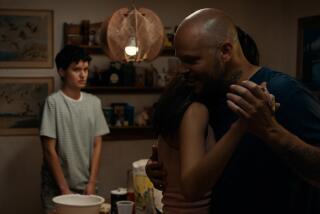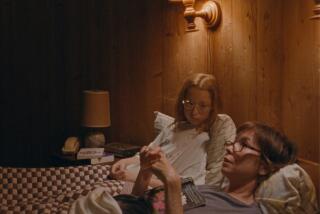Quiet drama in âAliceâs Houseâ
Alice, a manicurist in her 40s, lives in a small apartment in Sao Paulo, Brazil, with her husband, her elderly mother and her three teenage sons. Her husband cheats on her with very young girls, one of her sons is a hustler and another is a thief, and her lonely mother -- whom Aliceâs husband wants in a nursing home -- is losing her eyesight.
If this description makes âAliceâs House,â the first narrative feature by Brazilian documentary maker Chico Teixeira, sound histrionic or melodramatic or like a slow dive into a slough of despond, itâs because even the simplest description canât quite convey the low-key naturalism of this powerful, lapidary little movie. Shooting mostly in kinetic close-ups with no music, Teixeira doesnât rut around in the family dysfunction for the hysterical moments. Instead, he focuses on their matter-of-factness. All we see, for instance, of Aliceâs elder sonâs activities is what his grandmother spies from the balcony -- a few balled-up bank notes and a squeeze on his upper thigh. Instead, it trains its steady, rather merciless eye on the daily life of its protagonist, focusing on her continued, albeit diminished and sorely tested, capacity for hope and self-protective delusion -- if these donât amount to the same thing.
Most of the credit for this goes to Carla Ribas, whose Alice finds herself living in strangely hostile territory. Her husband no longer loves her and her sons are cold, surly and distant. Her mother, Dona Jacira (Berta Zemel), is equally isolated, turning for comfort during her daily chores to her favorite radio program, whose host, Carlinhos, she loves more than anyone. Although the women share the brunt of the work -- Alice brings home most of the money and Dona Jacira takes care of the housework -- they are treated like strangers in their own house, which, incidentally, Dona Jacira owns.
The depredations of home are temporarily forgotten at work, where Alice and her best client, Carmen (Renata Zhaneta), try to outdo each other with stories of how great they have it at home. Carmen, who is married to a rich car dealer, arrives at the salon every day in a shiny, new SUV, full of stories about how her husband kept her up all night making love. When Carmen sends her husband, Nilson (Luciano Quirino), in for a manicure, Alice is shocked to discover that heâs her first love, her boyfriend when she was 19. Soon, Alice learns that Carmen and Nilsonâs marriage is not too different from her own, and Nilsonâs reappearance in her life brings her an infusion of hope that had long ago disappeared.
Ribas creates an astonishingly intimate portrait of an ordinary woman whose equally ordinary life contains all the elements of tragedy. Small moments -- a rare private smile while alone in the bathroom, for instance -- take on surprising resonance, as do sudden, unforeseeable acts of God. What Teixeira has set out to do, and accomplished brilliantly, is to find drama and pathos in the mundane details, thoughtless betrayals and casual cruelties. What lingers after watching âAliceâs Houseâ are not the moments of conflict but the inexorable rhythms of daily life.
--
--
âAliceâs House.â MPAA rating: Unrated. Running time: 1 hour, 30 minutes. In Portuguese with English subtitles. In limited release.
More to Read
Only good movies
Get the Indie Focus newsletter, Mark Olsen's weekly guide to the world of cinema.
You may occasionally receive promotional content from the Los Angeles Times.










